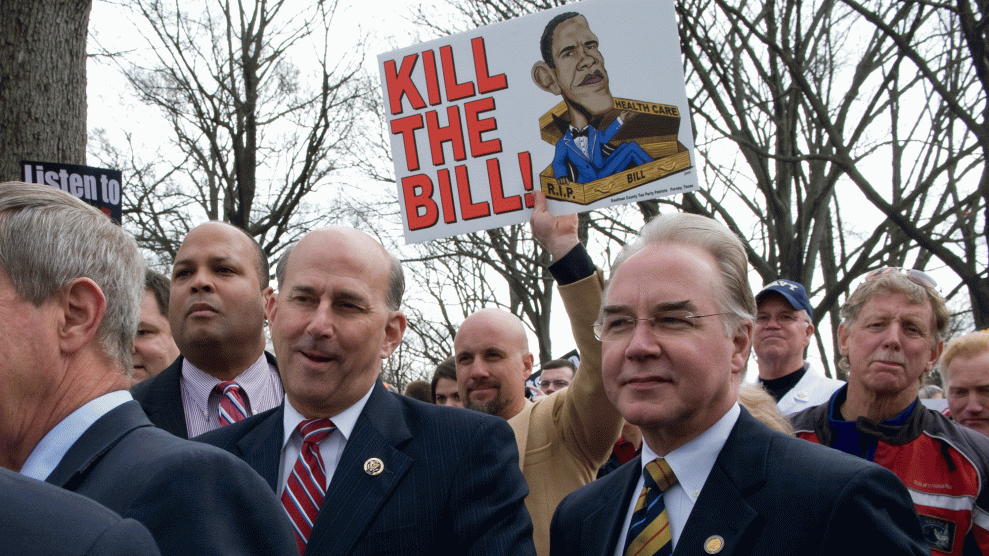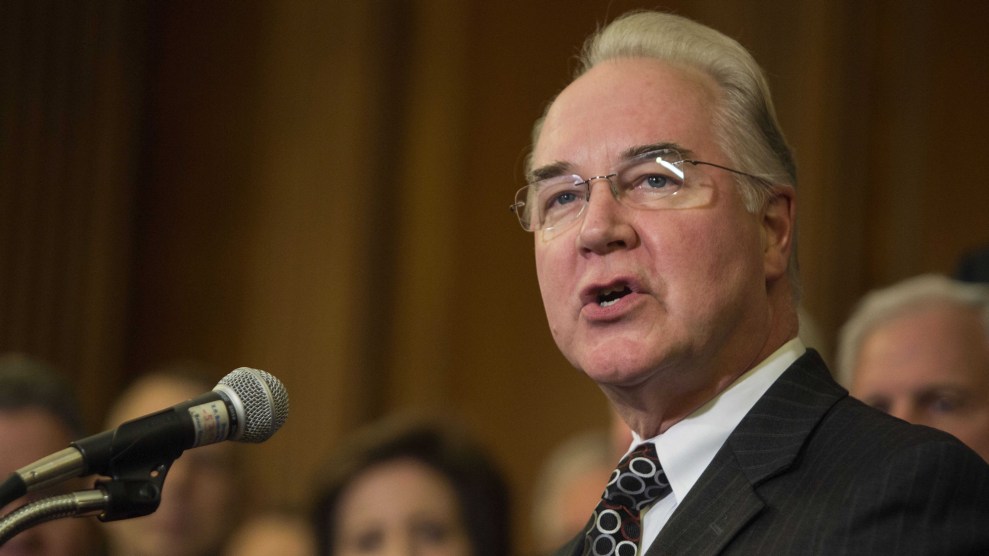
Rep. Tom Price (R-Ga.) at a tea party rally on Capitol Hill in 2010CQ Roll Call via AP Images
Last week, the Senate Health Committee grilled Rep. Tom Price (R-Ga.), President Donald Trump’s nominee to lead the Department of Health and Human Services (HHS), on his plan to dismantle Obamacare and his extensive trading in medical stocks. But when senators on the finance committee question him on Tuesday before voting on his nomination, they might want to ask about a line in his résumé that suggests he poses a much broader threat to government regulation of health care. Price has long been a member of the Association of American Physicians and Surgeons, a fringe medical group that is deeply opposed to any government role in regulating doctors.
AAPS got its start in the 1940s, with the help of members of the John Birch Society, the extreme right-wing group known for peddling outlandish conspiracy theories. It has fought the government over health care ever since. Its statement of principles declares it “evil” and “immoral” for doctors to participate in Medicaid and Medicare.
AAPS has been a vocal player in the anti-vaccine movement. Its medical journal has attacked immigrants as the source of disease outbreaks, including leprosy, and suggested that HIV doesn’t cause AIDS but that abortion causes breast cancer. The scientific consensus rejects all these claims. AAPS was the primary source of rumors during the presidential campaign that Hillary Clinton was suffering from a major illness. It has opposed electronic medical records, calling them a form of “data control” like that used by the Stasi, the former East German secret police. Researchers estimate that medical errors kill more than 250,000 Americans a year, making them the third leading cause of death, but AAPS dismisses such reports as a bogus pretext for more government regulation of health care. AAPS was a prominent opponent of the Affordable Care Act, and Price appeared regularly at its protests and events, speaking out against the health reform bill.
Price has been listed as a member of AAPS as far back as 2009, when the group touted him as a member in a press release. Multiple news accounts last month stated that Price was an active member of the group. However, AAPS general counsel Andrew Schlafly could not confirm whether Price is still a member of the group, and Price’s congressional office did not respond to a request for comment.
As HHS secretary, Price would be in charge of multiple federal offices involved in improving health care safety, a job that includes oversight of the regulation of individual physicians. But AAPS has opposed a wide range of government measures to hold individual doctors accountable, and even some private ones. It has fought to limit malpractice lawsuits and battled proposals to require board-certified specialists to recertify every 10 years to ensure their scientific knowledge is current. It has worked to strip disciplinary power from state medical boards and even gotten involved in lawsuits to weaken federal protections for the peer review process, in which doctors vet their colleagues.
“I think that Dr. Price has the potential to cripple the delivery system reform that is making patients safer and giving them better care every day,” says Michael Millenson, an adjunct professor at Northwestern University’s Feinberg School of Medicine who consults with the health care industry on reducing medical errors.
AAPS, though, is thrilled with his nomination. “The hope is that Tom Price will try to steer HHS in the right direction,” says Schlafly, the son of the late anti-feminist icon Phyllis Schlafly. “We were glad he got picked. We support him. We like him. He’s a good guy.”
AAPS has long been a bad doctor’s best friend. Over the years, it has waged concerted campaigns to protect doctors accused of misconduct.
In 2007, AAPS sued the Texas medical board when it tried to discipline some physicians for particularly egregious misconduct, including one doctor the board believed was injecting patients with jet fuel and formaldehyde as part of his “chemical sensitivity” treatments. (The doctor later explained that he was merely injecting patients with the “electromagnetic imprint” of carcinogens as part of his homeopathic treatments and was eventually allowed to keep his license, with some restrictions.) After six years of litigation, AAPS ultimately lost its lawsuit against the medical board. But in 2011, the group succeeded in persuading the Texas Legislature to strip the board of much of its power.
AAPS has defended doctors criminally charged with drug trafficking for overprescribing pain medication, a key factor in the opioid epidemic. One of those doctors, William Hurwitz, was alleged to have prescribed one patient 1,600 pain pills in a day. One of his patients allegedly died of an overdose after he prescribed her massive doses of morphine. After Hurwitz was sentenced to prison for 25 years, AAPS filed a brief as part of his appeal. (He was eventually retried and sentenced to just under five years.) In 2009, Price headlined the AAPS annual meeting where the conference materials included a poem Hurwitz wrote from prison.
The group championed Parvaz Dara, a New Jersey oncologist whose medical license was revoked in 2011 after his unsanitary medical practice infected at least 29 cancer patients with hepatitis B. AAPS issued press releases decrying Dara’s persecution, published his writing in its medical journal, and invited him to speak at its conferences. (The New Jersey medical board restored his license in 2014, with some restrictions.)
Schlafly says AAPS gets involved “when there’s an unfair action against a doctor for exercising his independent judgment.” He adds, “We’re more about standing out against government, against big hospital systems, against big insurance companies. There’s a libertarian streak in our organizations.”
AAPS is so opposed to any questioning of doctors that it’s fought peer review, the process used by doctors to evaluate each other’s work. Peer review is sacrosanct in medicine, and it’s enshrined in a federal law that protects doctors from lawsuits by other doctors to encourage them to participate in the process. AAPS has filed legal briefs in support of doctors who, after peer review, were denied hospital privileges because of their poor care and threat to patients; the group frequently argues in these cases in favor of making it easier for doctors to sue colleagues who blow the whistle on them.
Price has long supported the crusade against malpractice lawsuits. In Congress, he has advocated federal limits on malpractice suits, and his proposed Obamacare replacement legislation would restrict suits against doctors. But even without legislation, Price would have tremendous power as HHS secretary over how the government regulates doctors. For instance, he would oversee a national database aimed at preventing dangerous doctors from moving across state lines and continuing to practice. “Boy, our members dislike that National Practitioners Data Bank,” says Schlafly, who wants to limit hospitals’ ability to report disciplinary action to the database.
In 2011, Price introduced legislation to do just that. It didn’t pass, but he’ll have the ability to undermine the database at HHS. The Atlanta Journal-Constitution recently found that hospitals and medical boards routinely evade database reporting requirements, allowing many doctors accused of sexual assault to keep practicing. HHS could crack down on this problem, but Price seems more likely to weaken the reporting requirements than to enforce them.
AAPS’ opposition to federal efforts to improve health care extends beyond regulation of doctors. It has opposed federal funding for comparative effectiveness research to figure out, for instance, whether spine surgery is better than physical therapy for most back pain. (It’s not.) There’s little private support for such research because it threatens the health care industry’s bottom line, so it relies on federal funds. AAPS sees this sort of work as a gateway to government-rationed health care. That’s because the research could be used to end Medicare payments for ineffective care, such as lucrative but unnecessary spine surgeries or useless but expensive drugs. The group believes doctors should have the ultimate authority over all treatment decisions. Price apparently does, too. One of the many bills he sponsored to overturn Obamacare included language that would have banned comparative effectiveness research from being used to deny coverage for a treatment or procedure in a government health care plan. The bill would also have restricted the publication of the results of such research—potentially leaving the public in the dark about medical choices.
Patient safety advocates are particularly concerned that much of Price’s work as health secretary to advance AAPS’ agenda could occur out of the public view. “This is someone who belongs to a group that has singled out functions that protect the public that the public doesn’t even know exists,” says Millenson. “You’re talking about someone with a detailed agenda, and a detailed agenda to mess things up. If that doesn’t worry you, I’d like to know why.”
















